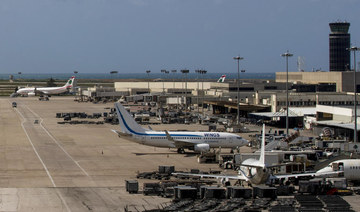RAFAH, Palestinian Territories: Heavy fighting rocked Gaza on Tuesday after G7 and Arab powers urged both Israel and Hamas to agree to a truce and hostage release deal outlined by US President Joe Biden.
Mediator Qatar said it had yet to see statements from either side “that give us a lot of confidence,” but the foreign ministry said Doha was “working with both sides on proposals on the table.”
Washington said it would seek a UN Security Council resolution to back the three-phase roadmap which Biden presented last Friday as Israel’s plan, even as the war has ground on.
Under the proposal, fighting would stop for an initial six weeks and hostages would be swapped for Palestinian prisoners, ahead of the start of a phase to rebuild Gaza, Biden said.
Israeli Prime Minister Benjamin Netanyahu has, however, stressed that fighting would only have to cease temporarily to free the captives, and that Israel still plans to destroy Hamas.
A statement from the premier’s office said Israel’s war cabinet was meeting in Jerusalem on Tuesday, but no further details were given.
A source with knowledge of the truce negotiations said CIA chief Bill Burns would be “returning to Doha... to continue working with mediators on reaching an agreement between Hamas and Israel on a ceasefire in Gaza and the release of hostages.”
Biden told Qatar’s emir that “Hamas is now the only obstacle to a complete ceasefire,” and “confirmed Israel’s readiness to move forward” with the terms he set out last week.
Hamas, which has long ruled the Palestinian territory of 2.4 million people, said Friday it viewed Biden’s outline “positively.”
But a senior Hamas official in Beirut on Tuesday accused Israel of seeking “endless” truce negotiations, and repeated the group’s position rejecting any deal that excludes a permanent ceasefire.
Hamas has stuck to that position in months of intermittent talks involving US, Qatari and Egyptian mediators.
Those three countries have now urged both sides to agree a truce deal, as have Saudi Arabia, the United Arab Emirates and Jordan.
The Group of Seven countries also gave their full endorsement, arguing the plan would also bring vastly more aid into Gaza and “an enduring end to the crisis, with Israel’s security interests and Gazan civilian safety assured.”
“We call on Hamas to accept this deal, that Israel is ready to move forward with, and we urge countries with influence over Hamas to help ensure that it does so,” said the G7 which also includes Britain, Canada, France, Germany, Italy and Japan.
UN Middle East envoy Tor Wennesland also urged both sides to back the proposal, writing on X that “there is no alternative — and any delay, every day simply costs more lives.”
The Gaza war raged on unabated, with the Israeli military reporting its fighter jets struck around “65 terror targets” across Gaza and that troops located tunnel shafts and weapons in the southern city of Rafah.
It also said warplanes and ground forces were attacking targets in the Bureij area in central Gaza.
Four bodies were retrieved from a bombed house in Bureij, and three more from a destroyed building in Gaza City, the civil defense agency said.
Gaza’s government media office said another Israeli strike killed eight police officers in Deir Al-Balah.
The White House insisted Monday that the truce plan was Israel’s own and not drafted by Washington to put pressure on its key ally.
However, Biden also took a swipe in an interview with Time magazine at Netanyahu, who is leading a shaky right-wing coalition government and has been fighting corruption claims in court.
Asked if he believed the Israeli premier was dragging out the war for political self-preservation, Biden said: “There is every reason for people to draw that conclusion.”
Biden also said that he and Netanyahu were at odds over the need to create a Palestinian state.
“My major disagreement with Netanyahu is, what happens after... Gaza’s over? What, what does it go back to? Do Israeli forces go back in?” he asked.
“The answer is, if that’s the case, it can’t work.”
French President Emmanuel Macron on Tuesday told Netanyahu in a phone call that the Palestinian Authority of president Mahmud Abbas that rules parts of the occupied West Bank should “ensure the governance” of Gaza after the war.
Macron said the proposed truce deal “should reopen a credible perspective for the implementation of a two-state solution, the only one able to provide Israel with the necessary security guarantees and to respond to the legitimate aspirations of Palestinians.”
Netanyahu’s office said he told Macron Israel’s “fundamental objective,” in addition to securing the hostages’ release, was to eliminate Hamas, and that it was determined to do so.
On the political front, Slovenia’s parliament on Tuesday recognized the State of Palestine, following fellow European Union members Ireland and Spain as well as Norway last month in a move that enraged Israel.
The war was sparked by Hamas’s October 7 attack on southern Israel, which resulted in the deaths of 1,194 people, mostly civilians, according to an AFP tally based on Israeli official figures.
Militants also took 251 hostages, 120 of whom remain in Gaza, including 41 the army says are dead.
The Israeli military on Monday confirmed the latest deaths of captives, naming them as Nadav Popplewell, 51, and three men in their 80s, Chaim Perry, Yoram Metzger and Amiram Cooper.
The Hostages Families Forum group, which has joined a series of mass protests demanding a truce deal, said the men “should have returned alive to their country and their families.”
Israel’s bombardment and ground offensive have killed at least 36,550 people in Gaza, also mostly civilians, according to the Hamas-run territory’s health ministry.
Some 55 percent of Gaza’s structures have been destroyed, damaged or “possibly damaged,” according to the United Nations satellite analysis agency.
Aid group Oxfam said displaced Gazans are living in “appalling” conditions, with children sometimes going for a whole day without food and thousands sharing the same toilet.
UN human rights chief Volker Turk also threw his support behind the truce plan, saying of the war that “we don’t even know how to describe it anymore.”
“It is beyond precarious. It is beyond catastrophic.”



























